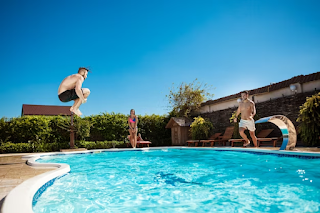Ensuring Safety and Compliance: A Comprehensive Guide to Home Pool Inspections in Victoria
Importance of Home Pool Inspections:
The safety of swimming pool and spa safety is paramount, and home pool inspections serve as a proactive measure to identify and rectify potential hazards. Drowning, entrapment, and other accidents can occur if pools are not adequately maintained and secured. Regular inspections act as a preventive measure, ensuring that pools comply with safety standards and regulations.
The Role of a Pool Inspector:
A pool inspector plays a pivotal role in the home pool inspection process. Trained to assess various aspects of pool safety, inspectors conduct thorough examinations to identify potential risks and non-compliance issues. Their responsibilities encompass a wide range of factors, including pool structure, barriers, water quality, and equipment.
 |
| swimming pool and spa safety |
Key responsibilities of a pool inspector include:
1. Structural Integrity:
Inspecting the physical structure of the pool or spa to ensure that it is sound, free from cracks, and in compliance with construction standards.
2. Barrier Assessment:
Evaluating the effectiveness of safety barriers such as fences, gates, and latches. Ensuring that these barriers are in good condition and meet the specified height and gap requirements.
3. Water Quality and Circulation:
Testing the water quality to ensure it meets health standards and assessing the functionality of circulation systems, filters, and pumps.
4. Equipment Inspection:
Checking the condition and safety of equipment such as pool covers, heaters, and lighting fixtures to prevent potential hazards.
5. Compliance with Regulations:
Verifying that the pool or spa complies with the pool safety regulations and standards set by the relevant authorities.
Pool Regulations in Victoria:
In Victoria, pool regulations victoria are governed by the Building Act 1993 and the Building Regulations 2018. These regulations outline the requirements for the construction, maintenance, and safety of swimming pools and spas. Key components of pool regulations in Victoria include:
1. Safety Barriers:
Regulations stipulate that all swimming pools and spas must be surrounded by safety barriers to prevent unauthorized access, particularly by young children. The height, design, and gaps of these barriers are specified to ensure effectiveness.
2. Gate and Door Requirements:
Gates and doors providing access to the pool area must be self-closing and self-latching to prevent unintentional entry. They should open outward from the pool and be equipped with latches beyond the reach of young children.
3. CPR Signage:
Pools and spas are required to display CPR (Cardiopulmonary Resuscitation) signage in a prominent location. This signage provides crucial information on the steps to be taken in case of an emergency.
4. Registration:
Property owners are obligated to register their pool or spa with the relevant local council. This includes providing details such as the location, type, and construction date of the pool or spa.
5. Inspection and Compliance:
Regular inspections are mandatory to ensure ongoing compliance with safety standards. Non-compliance may result in penalties, and rectification is required to address identified issues.
Pool Safety Compliances:
Ensuring compliance with pool safety Compliances is not only a legal requirement but also a fundamental step in preventing accidents and safeguarding lives. Homeowners can take proactive measures to maintain pool safety compliances:
1. Regular Maintenance:
Consistent maintenance of pool structures, equipment, and safety barriers is essential. Regular checks for wear and tear, leaks, and proper functioning of safety features are crucial in preventing accidents.
2. Water Quality Management:
Monitoring and maintaining water quality is vital for preventing health-related issues. Regular testing for chemical balance, filtration efficiency, and cleanliness is necessary.
3. Upkeep of Safety Barriers:
Ensuring that safety barriers, including fences and gates, are well-maintained and meet the specified standards. Any damage or malfunction should be promptly addressed.
4. Educating Pool Users:
Promoting awareness among pool users, especially children, about the importance of pool safety rules and the potential dangers of unsupervised access.
5. Professional Inspections:
Engaging a qualified pool inspector for regular assessments is a prudent step. Professional inspections provide a comprehensive evaluation of the pool's safety features and identify any areas of non-compliance.
home pool inspections in Victoria are a critical aspect of ensuring the safety and compliance of swimming pools and spas. With regulations in place to address various safety aspects, homeowners play a vital role in maintaining a safe pool environment. Pool inspector, equipped with expertise and knowledge, contribute significantly to this process by conducting thorough assessments and guiding homeowners in rectifying non-compliance issues. Ultimately, the collaborative effort between homeowners, pool inspectors, and regulatory authorities is instrumental in creating a secure and enjoyable aquatic experience for all. Regular adherence to safety standards not only safeguards lives but also promotes a culture of responsible pool ownership in the community.



Comments
Post a Comment